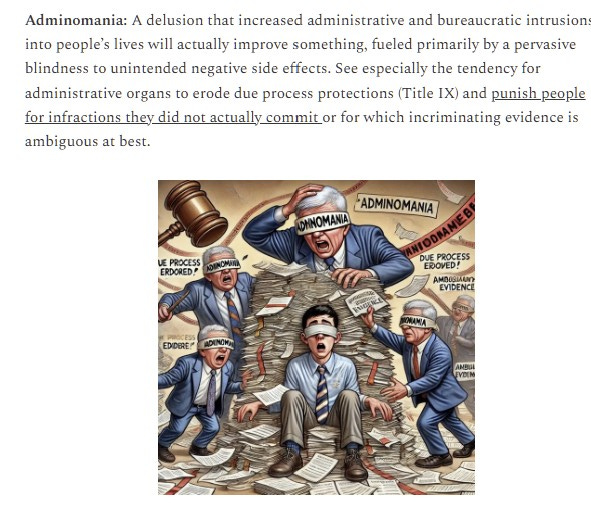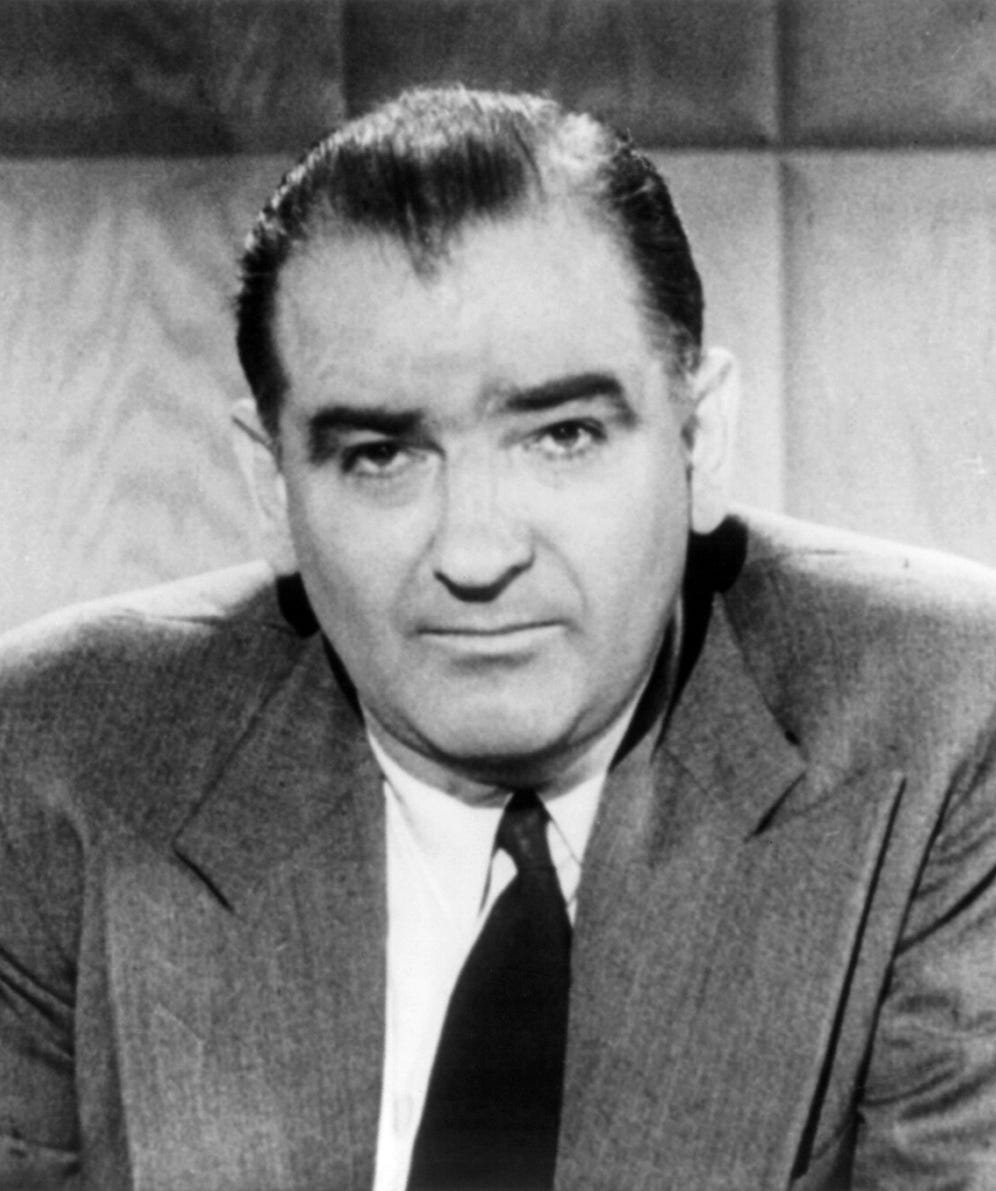Bad Professors
The Truth About Campus Investigations
This essay is an introduction and synopsis of Professors Speak Out: The Truth About Campus Investigations, published in 2025 by Academica Press. It is available on Amazon or at bookshop.org.
Nicholas H. Wolfinger is Professor of Family and Consumer Studies and Adjunct Professor of Sociology at the University of Utah. He is the author of four other books, most recently Thanks for Nothing: The Economics of Single Motherhood since 1980 (Oxford University Press, 2024). Nick’s work has appeared in the Atlantic, National Review, Huffington Post, and various academic journals.
“A new McCarthyism has descended on higher education”
If I had a dollar every time I read that phrase, I could afford to endow a chair in McCarthy studies. Centrists and conservatives used it a lot during the Great Awokening of the 2010s. Progressives got their turn after the October 7 Hamas attack. And, of course, the second Trump presidency and its assault on higher education has been manna for the McCarthyism-pronouncers.
None of these folks are wrong, except perhaps for their reliance on a tired trope. Per a recent report from FIRE, faculty members today are 3-4 times as likely as their McCarthy-era colleagues to say they’ve self-censored their writing, lectures, or interviews. Paranoia? Not so. The faculty members surveyed by FIRE are right to be concerned. The number of professors investigated for their speech jumped from four in 2000 to 145 in 2022.1 And this is but the tip of the iceberg: targeted faculty members are sworn to secrecy, and we only learn about their investigations when the target is famous, files suit against her employer (or former employer), or chooses herself to raise a fuss.
I’m one of these faculty members: the University of Utah, where I’ve taught since 1998, investigated me three times between 2016 and 2021. My initial reaction to my first inquest was that my university had just come up with a new way to fuck with me. After all, Utah and I had long had a contentious relationship. It was only when I read Northwestern film scholar Laura Kipnis’s account of her own investigation that I realized that problem was bigger than me.
So I set out to make lemonade out of the lemons the University of Utah kept handing me. I wrote about each investigation for a popular audience. I started volunteering for FACE, a non-profit that provides peer counseling to faculty, students, and staff falsely accused of sexual misconduct, and lobbies for better state and federal policy. I became FACE’s faculty coordinator, the point of conduct for all college faculty who contacted us. Doing this work drove home what the national data were showing: a ton of faculty members were suffering bullshit investigations. and people needed to hear about it. So I decided to put together an anthology of faculty investigation stories.
I solicited contributors for Professors Speak Out in 2021-2022. Coming on the heels of the murder of George Floyd and the racial reckoning, it was of little surprise that a plurality of stories involved allegations of racism. Perhaps the most representative story here is from Jason Kilborn, on the law faculty at the University of Illinois-Chicago. In an exam question for his administrative procedures class, he identified a hypothetical employer as a racist by saying that she’d called an African American the N-word. The epithet was written as n_____, not spelled out. Kilborn had used this exam question for a decade without incident, but this didn’t fly in 2020. The result was eight months of meetings, struggle sessions, and sensitivity training. And while this sort of administrative torment may have peaked in 2020, the underlying dynamics weren’t new. Indeed, several contributors to Professors Speak Out—Lee Jussim, Patanjali Kambhampati, Mark Mercer, Stephen Porter, Frances Widdowson—were targeted by their universities for speaking out against higher education’s dalliance with identitarianism. Doing so cost Frances a tenured professorship in economics at Mount Royal University in Canada.
The next largest group of contributors to Professors Speak Out were faculty members investigated for sexual misconduct. In 2011, the U.S. Department of Education issued guidance that came to have a baleful effect on universities. DoE threatened schools with pricy compliance reviews, a federal blacklist, and the loss of federal funds if they weren’t sufficiently aggressive in ferreting out sexual misconduct. While no universities were ever defunded on these grounds, the compliance reviews were real and often cost hundreds of thousands of dollars. The government thus established a system of perverse incentives for universities to investigate any allegations of misconduct, no matter how frivolous. Schools duly learned to use their new inquisitorial tools in pursuit of institutional goals. This was how Louisiana State University fired contributor Teresa Buchanan from a tenured professorship after a hearing that lasted over eleven hours, all in a single day. Her crime was salty language (“fuck,” after all, can have sexual connotations even when it’s not used in a sexy context).
Northern Texas University used sexual misconduct as a pretext for firing tenured philosopher Robert Frodeman. He wasn’t saved by his sixteen books, nor by the millions in grant money he’d brought to his school. His crime was raising too many inconvenient questions about fracking, something that didn’t fly in Texas.
And finally, there are the contributions to Professors Speak Out that involved religion or politics. Here the most mind-boggling story came from Deandre Poole, a communications instructor at Florida Atlantic University. What began as a popular classroom exercise ended up in denunciations for heresy on Fox News and from Marco Rubio (then a Florida senator) and then-Governor Rick Scott. Death threats and racist invective poured in from all over the world (Deandre is African American). Florida Atlantic put him on leave, but in the end rallied behind him.
Why is this happening to us? I review a variety of possible explanations in the introduction. The Great Awokening—the sea change in attitudes towards race and racism in the 2010s—surely played a part. So too did the aforementioned change to federal guidance in 2011. The student body has changed substantially in the last twenty years. As suggested by the work of Jonathan Haidt and Greg Lukianoff, students now see disfavored ideas as dangerous, and seek the protection of university administrators. At the same time, universities were increasingly seeing their undergraduate students as customers valuable for their tuition dollars—and in a confrontation with a faculty member, the customer is always right.
This new collegiate consumerism arose at the same time that campus bureaucracies mushroomed. This includes the rise of administrative units devoted to discipline and punishment. Harvard University, so often in the higher education vanguard, employs over 50 apparatchiks responsible for policing and adjudicating allegations of sexual misconduct on campus. A police force of this size can’t help but find bad guys (“Show me the man and I’ll show you the crime,” said Andrey Vyshinsky, the chief prosecutor at Stalin’s show trials). Finally, social media and political polarization have turned higher education into a proving ground for our culture wars. Many academic investigations are driven by partisan politics, from both the left and the right. Investigations from the left almost always originate on campus, while investigations from the right generally originate off campus. There are conservative watch-lists of faculty “radicals” that can ignite or accelerate social media campaigns against faculty members. In turn, public pressure can lead universities to take investigatory action.

One thing Professors Speak Out makes clear is that in many, perhaps most, cases the investigation itself is often the punishment. Teresa Buchanan’s eleven hour hearing is an extreme example, but tribunals lasting several hours are commonplace. I experienced one of them myself, all over a social media post my dean didn’t like. And when your career is on the line, it’s a good idea to retain legal counsel. I’ve spent over $25,000 on attorneys, but I got off easy. Dave Wiley spent hundreds of thousands of dollars on lawyers, but still lost his tenured faculty position at Southwestern Texas State University. And then there’s the paperwork. Over the years the University of Utah has compelled me to write over fifty pages of memos. Lee Jussim and Nate Honeycutt recount having to produce thousands of pages of documents to fend off malicious complaints lodged with their university’s human subjects committee (Somewhere, the trees are weeping.)
The damage of all this investigating is incalculable. Professors Speak Out documents the destruction of vibrant careers, with federal grant money squandered in the process. The norms of academic freedom and open inquiry always suffer. Even when we’re exonerated of spurious allegations, we’ll be a little more careful about what we study, what we say, and what we write. And if word gets out about our time in the barrel? As with any crucifixion, it’s pour encourager les autres.
Lee Jussim and I have a decade-long argument about the state of American higher education. He’s more pessimistic, whereas I continue to hold it in highest regard, warts and all. Despite all the replication crises, it’s still given rise to the greatest economy in human history. Despite the lack of viewpoint diversity, over one million foreign students chose to spend the 2023-2024 academic year studying in America. Despite all the frivolous courses like that Skidmore College offering on the sociology of Miley Cyrus, quality scholarship is being produced in every academic field (Think all of sociology is frivolous? Good luck with that next census.)
This is what we lose if we let all the little Vishinskys scare the best and brightest away from academia.
And if you, the reader, are still wondering, here’s a quick summary of why the University of Utah investigated me three times:
Investigation #1: Title IX sexual misconduct. Twenty years earlier I’d told my colleagues that I had proposed to my ex-wife at a strip club.
Investigation #2: Hostile body language in faculty meetings (e.g., rolling my eyes).
Investigation #3: A bad tweet.
For more on this, Nick is doing a full court press on this book, in podcasts and academic conferences (some of which involve me as well).
Links to media for Professors Speak Out:
Nick’s talk about the book at a USC conference on censorship in the sciences (8 minutes) January 8, 2025
National Association of Scholars webinar (90 minutes), April 29, 2025, with me, Bob Frodeman, and Jason Kilborn
Coming from Left Field interview (60 minutes), conducted on April 25, 2025
The Project Censored interview (30 minutes), conducted on April 22, 2025
https://www.projectcensored.org/campus-life-in-the-crosshairs/
Both of the interviews will air (or have aired) on local FM talk radio stations.
May 14, with me, Patti Adler, and Stephen Porter, moderated by Alice Dreger and sponsored by Heterodox Academy(a nonpartisan professional association devoted to diversity of thought in higher education; it tends to attract all sorts of academic dissidents).
https://heterodoxacademy.org/events/when-university-investigations-of-faculty-go-off-the-rails/
May 22, with me, Dave Porter, and Lee Jussim, sponsored by the Martin Center for Academic Renewal, a right-libertarian higher education nonprofit.
https://jamesgmartin.center/event/professors-speak-out-the-truth-about-campus-investigations/
Footnote
“The number of professors investigated for their speech jumped from four in 2000 to 145 in 2022.” Lee here. The 145 number is from FIRE’s Scholars Under Fire Database, which tracks this sort of thing based on publicly available information, which, as Nick pointed out correctly, is probably the tip of the iceberg. FIRE also produced data strongly suggesting a vastly higher number. The 2024 FIRE Faculty Survey found that 14%, or nearly 900 of over 6000 respondents, reported having been investigated or threatened with investigations by their institutions. If that response generalizes to the population of American faculty, it means there have been tens of thousands or maybe even hundreds of thousands of such investigations (or threats) over the last 10 years. According to the National Center for Education Statistics, there are over 1.5 million faculty in the U.S. That means that, if the FIRE survey results generalize, somewhere around 200,000 faculty have been investigated or threatened with investigation. Even if they overestimate this figure by 80%, which seems highly unlikely, the figure is about 40,000. And even that number may understate the number of investigations because it is the number of faculty. Some faculty, such as Nick and me, have been investigated multiple times. We do not know the proportion of those faculty reporting having been investigated or threatened with investigations more than once, because no survey has yet asked this question.








This is really interesting and eye-opening, thanks.
You didn't have to tell us about your own experiences, but the fact that you did gives you credibility.
There's a catch to that though - having told us, you open yourself to scrutiny of course, which can backfire credibility-wise. You only provided a partial account of the 1st complaint against you. You mention the one part about the 20-year-old remark, repeatedly, but also repeatedly choose not to say what the other parts of the 1st complaint were. Leading the reader to wonder whether you are being self-serving in your choices of what to reveal, and whether the credibility we are tempted to award you is deserved, which determines whether we take what you say here seriously.
In this case, fuller disclosure is warranted.
I hope that these professors offer their skills independently on the internet and achieve massive success.
Are we experiencing the beginning of the death of large institutions?